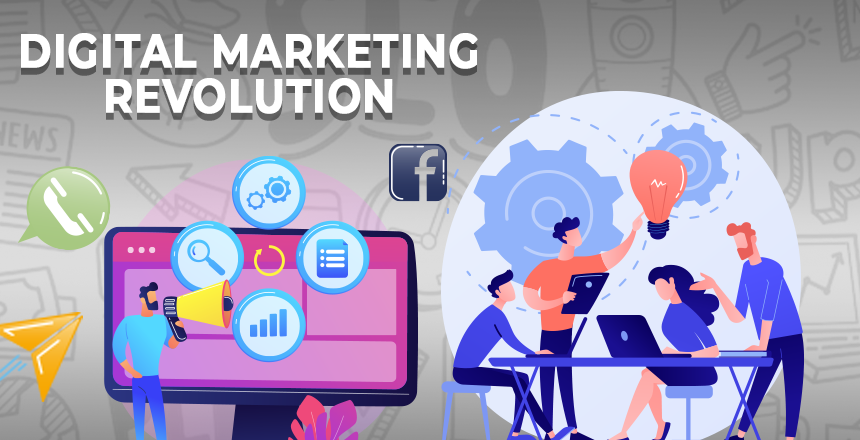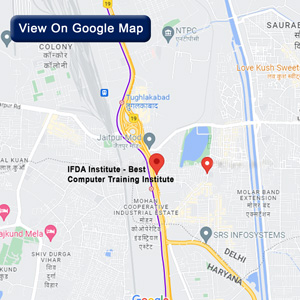The Digital Marketing Revolution: How to Stay Ahead in a Fast-Paced World

In today’s digital age, marketing has undergone a complete transformation. Gone are the days when billboards and radio spots were enough to capture consumer attention. The rise of digital platforms has created a revolution, and businesses must adapt to keep pace. From social media to AI-driven analytics, the modern marketing landscape is fast-evolving. This blog will explore how businesses can stay ahead in this competitive environment and leverage the tools at their disposal to thrive in the digital world.
The Evolution of Digital Marketing
The revolution in digital marketing has been driven by technological advancements and shifting consumer behaviors. Consumers now interact with brands primarily online, whether through social media, search engines, or email. This shift has forced marketers to move beyond traditional techniques and focus on online strategies that engage users in real-time.
Key Milestones in the Digital Marketing Revolution:
Search Engine Optimization (SEO): The rise of search engines like Google has made SEO critical for brands looking to increase visibility.
Social Media Platforms: Facebook, Instagram, Twitter, and LinkedIn have created new avenues for brands to reach and engage with audiences.
Mobile and Digital Ads: The shift to mobile devices has reshaped digital advertising, making it more personalized and location-specific.
Data Analytics: AI and machine learning have enabled marketers to use data-driven strategies that personalize experiences and predict consumer behaviors.
Staying Ahead: The Importance of Agility To stay competitive in the digital marketing revolution, businesses need to be agile. The speed at which technology and consumer behavior change means marketers must be ready to adapt their strategies quickly. However, agility isn’t just about reacting to trends. It involves staying informed, investing in the right technologies, and being open to experimentation.
The Evolution of Digital Marketing
The revolution in digital marketing has been driven by technological advancements and shifting consumer behaviors. Consumers now interact with brands primarily online, whether through social media, search engines, or email. This shift has forced marketers to move beyond traditional techniques and focus on online strategies that engage users in real-time.
Tips for Maintaining Agility in Digital Marketing:
Monitor Trends: Keeping an eye on trends allows businesses to act before their competitors do. Whether it’s a new platform, a change in search algorithms, or consumer behavior shifts, being aware of trends is crucial.
Invest in Automation Tools: Automation tools can free up time for marketers to focus on creative and strategic tasks. They also ensure that repetitive tasks, such as email marketing or social media posting, are handled efficiently.
Test and Experiment: A key to staying ahead in digital marketing is to test different approaches. Whether it's A/B testing emails or trying new ad formats, experimentation helps businesses learn what works best.
Stay Customer-Centric: In a fast-paced world, it’s easy to focus on the latest technology, but businesses must remember that customers come first. Understanding customer preferences, behaviors, and needs allows for creating more effective campaigns.
Content is Still King
Despite the technological advancements, one thing has remained constant: content is still king. High-quality content that resonates with audiences is crucial for success in digital marketing. Whether it's blog posts, video content, social media updates, or podcasts, content is what drives engagement and conversions.
Content Marketing Tips for Success:
Focus on Storytelling: People connect with stories more than they do with ads. Share real stories about your brand, employees, or customers to build a deeper connection with your audience.
Utilize Video: Video content continues to dominate digital marketing. From explainer videos to live streaming, it’s one of the most engaging forms of content available.
Optimize for SEO: Content should not only be engaging but also optimized for search engines. This means using keywords naturally, structuring content with headings, and including meta descriptions and tags.
Repurpose Content: Don’t limit yourself to a single format. Repurpose blog posts into social media posts, podcasts, or infographics to reach a wider audience.
Data-Driven Marketing: The Key to Personalization One of the most significant changes in the digital marketing revolution is the ability to gather and analyze data. With advanced analytics tools, marketers can track consumer behavior, preferences, and purchasing patterns in real-time. This data-driven approach allows businesses to create personalized campaigns that resonate with their target audience.
Content is Still King
Despite the technological advancements, one thing has remained constant: content is still king. High-quality content that resonates with audiences is crucial for success in digital marketing. Whether it's blog posts, video content, social media updates, or podcasts, content is what drives engagement and conversions.
Benefits of Data-Driven Marketing:
Improved ROI: By focusing on data, businesses can create more effective campaigns that drive higher returns on investment.
Better Customer Targeting: Data allows businesses to segment their audience and target the right people with the right message at the right time.
Enhanced Customer Experience: Personalization powered by data helps to create a seamless experience for the customer, improving satisfaction and loyalty.
The Role of AI and Automation in Digital Marketing
Artificial intelligence (AI) and automation are revolutionizing digital marketing by streamlining processes and improving campaign effectiveness. AI can predict consumer behavior, create personalized content, and even manage customer service interactions via chatbots.
AI-driven marketing techniques:
Predictive Analytics: AI can analyze consumer data to predict future behavior, helping marketers anticipate customer needs and tailor their campaigns accordingly.
Chatbots and Virtual Assistants: Automated systems like chatbots help brands interact with customers 24/7, improving customer service and engagement without human intervention.
Programmatic Advertising: AI is also driving programmatic advertising, where ad buying is automated to target the most relevant audiences in real-time.
The Power of Social Media
Social media has emerged as one of the most influential channels in digital marketing. With billions of users across platforms like Facebook, Instagram, TikTok, and LinkedIn, social media provides businesses with the opportunity to engage with their audience directly, build relationships, and drive brand awareness.
Social Media Best Practices:
Engagement Over Followers: Focus on building a community rather than just increasing your follower count. Engagement through comments, likes, and shares will have a more significant impact on your brand.
Leverage Influencers: Partnering with influencers in your niche can help expand your reach and establish credibility among their followers.
Create Shareable Content: The more shareable your content is, the wider your organic reach will be. Create posts that resonate emotionally or provide valuable insights to encourage sharing.
Navigating Challenges in Digital Marketing
While the digital marketing revolution has opened up countless opportunities, it has also introduced challenges. Increased competition, rising customer expectations, and privacy concerns are just a few obstacles businesses must navigate.
Common Challenges:
Data Privacy and Security: With data being at the core of digital marketing, ensuring its protection and compliance with regulations like GDPR is paramount.
Ad fatigue: consumers are constantly bombarded with ads, leading to ad fatigue. Brands need to find ways to stand out without overwhelming their audience.
Keeping Pace with Technology: The rapid pace of technological advancements can be overwhelming. Staying ahead requires constant learning and adaptation.
Conclusion
The digital marketing revolution is continuously evolving, and businesses must adapt to stay ahead in this fast-paced world. By focusing on agility, content quality, data-driven strategies, and leveraging new technologies like AI and automation, companies can position themselves for success. Staying informed about trends, testing new approaches, and always keeping the customer at the center of marketing strategies will ensure businesses thrive in the digital age.
Embrace the revolution, and you’ll not only survive but thrive in the ever-changing digital marketing landscape.
- Written By - Natasha Singh









